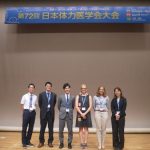Matsuyama, Japan, Sept 27, 2017: The 72nd congress of the Japanese Society of Physical Fitness and Sports Medicine (JSPFSM) took place from 16th-18th September, 2017 in Matsuyama, Japan (72nd JSPFSM congress Matsuyama Japan).
Although the southern island of Shikoku’s largest city, Matsuyama in the Ehime prefecture is small by Japanese standards. Upon arrival, we were warmly welcomed and treated to a fantastic hotel with views of Matsuyama castle, the centerpiece of the city, as well as glimpses of the Seto Inland Sea. A real treat!
Despite having a population of more than 500,000, a sense of calm pervades the city of Matsuyama. There is no pushing or shoving – everyone has the time to stop, bow and acknowledge each other (including two foreigners navigating Japanese culture for the first time).
After coming from the bustling cities of Sydney and Melbourne, it was wonderful to be immersed within a culture that honors patience, politeness and respect of others so highly. Buying a Starbucks coffee involved an unexpected amount of bowing and thanking, which leaves a smile on your face. This should happen everywhere in the world!
Over the long weekend spent in Matsuyama, we had opportunity to experience some of the other cultural attractions the city is known for. Dogo Onsen is one of Japan’s oldest onsen hot springs (over 1000 years old) and provided a relaxing, authentic Japanese experience.
Matsuyama Castle, with its white walls and wooden beams provided another interesting attraction and stunning 360° views the city. The surrounding mountains were spectacular on a sunny day and a welcome reward after the steep, humid climb to the castle gates. The smell of pine which emanated from within the castle walls was a fascinating feast for the senses and we spent hours embracing this 17th century architectural delight.
Our sightseeing also transcended the traditional and was completed by some modern retail therapy. Getting lost in Okaido shopping arcade’s extensive maze of laneways, restaurants, Japanese handicrafts, gaming arcades and hundreds of teenagers on bicycles congregating for Friday night entertainment, was both mesmerising and conducive to incidental exercise.
The evening prior to the International Session, we had the opportunity to immerse ourselves in the local culinary delights thanks to the generosity of Professor Ryoichi Nagatomi. We were joined by two other international speakers from The Netherlands (Holland), Dr DirkJan Veeger and PhD Candidate Erik van der Graaff.
In traditional Japanese restaurants, shoes must be removed before entering. This made us feel as though we were settling into a cosy home, rather than eating out on a Saturday night. Once inside, we were graciously ushered to our private booth with a very low table (which luckily had a pit underneath to dangle your legs).
As westerners, everything in Japan feels comparatively small, so one must quickly learn to gracefully maneuver around the delicate Japanese eating rooms. Another curiosity for us was having to press a call button within our private space to gain the attention of the waiters and waitresses – a unique experience which demonstrated the Japanese value of discrete public conduct.
Taimeshi was on the menu, a local dish considered to be “fast food” as nothing but the rice is cooked. Taimeshi is raw sea bream, mixed into a special broth of raw egg and soya sauce and eaten with rice. Paired with sake from the region, the meal was extremely “lekker” as the Dutch would say! The international company and traditional food was a very enjoyable start to the conference and our time in Japan.
As wonderful as the new smells, tastes and sites of Matsuyama were, we also had the conference to enjoy. Matsuyama University was the host of the 2017 JSPFSM congress and a short, leisurely walk from our hotel. As fate would have it, the afternoon of our session coincided with a flight-cancelling typhoon scheduled to pass over the city.
Professor Nagatomi had forewarned us of this severe weather, but in our relaxed Australian way, we did not heed his warnings. The minute we began to make our way to the University, the heavens opened with full force.
Our scheduled short walk instead turned into a fun taxi trip (with some miscommunications) and despite our best efforts with flimsy umbrellas, we arrived at the conference quite wet.
All that time spent on our pre-conference make-up had been thwarted! Luckily, we were warmly welcomed by Associate Professor Masashi Miyashita who took us to the University “powder room,” where we could relax and fix ourselves prior to presenting (we wondered if these rooms were designed purely for such occasions…).
Despite its reduced numbers due to the typhoon, the International Session was a success and we were greeted by an attentive audience. The challenge of presenting our PhD research to an English as a Second Language (ESL) crowd was a valuable learning curve for both of us as early career researchers.
It was also fantastic to witness the presentations and award ceremony of young Japanese investigators whose work aimed to enhance the health of their national citizens. The typhoon however, came a close second to stealing the show…it was impressive!
Overall, having the opportunity to present our PhD research as invited speakers of the 2017 JSPFSM congress was indeed a special experience in our early research careers and one that we will remember for many years to come.
We would warmly like to thank ECSS and the JSPFSM organising committees for making this opportunity possible, with special mention to Associate Professor Miyashita, Professor Nagatomi and colleagues for their generous hospitality.
Hopefully we will meet again in Japan or at an ECSS conference in the future.
ありがとうございました
(Arigatōgozaimashita)
Kristy O’Neill and Louisa Lobigs (Australia)



Leave a Reply
You must be logged in to post a comment.